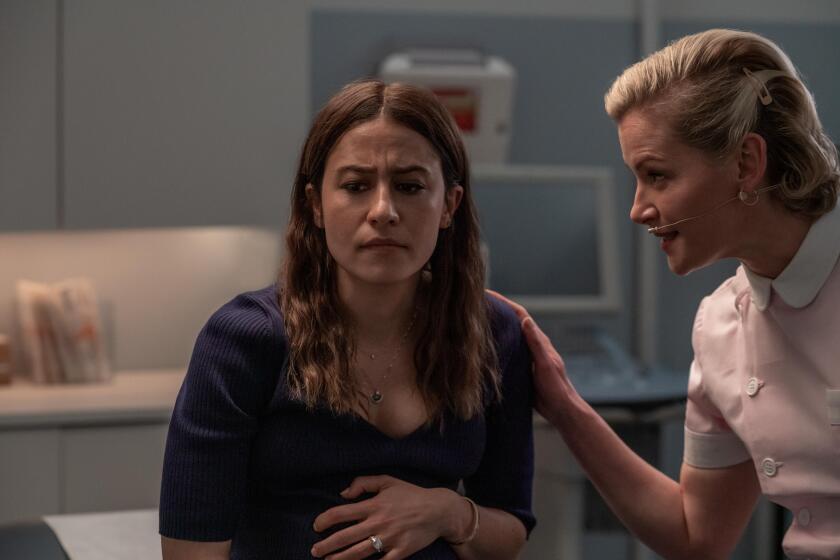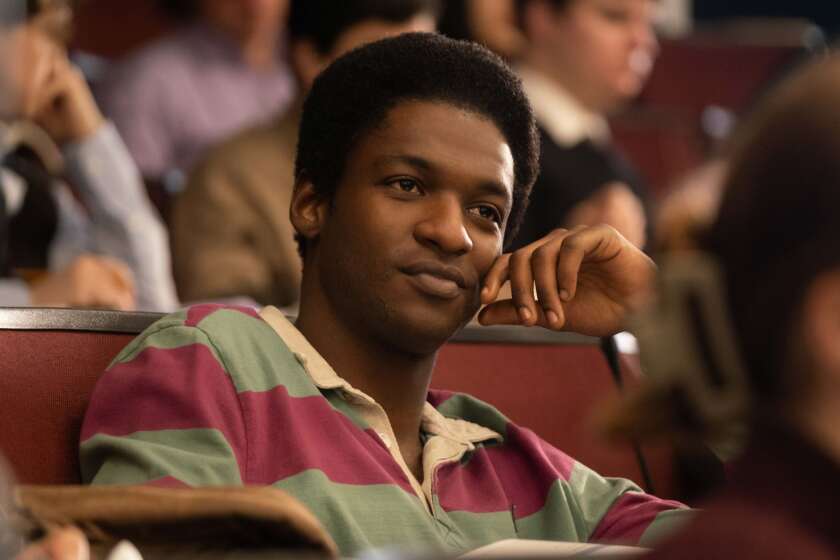Review: Unfiltered and unabashed, ‘Babes’ gets at the basic truth of motherhood

Somebody needs to explain to me why Pamela Adlon’s “Babes” is being released the weekend after Mother’s Day. If ever a film stood a chance of becoming the “Love Actually” of Mother’s Day, it’s “Babes.”
Sure, it’s rated R for sexual material, language throughout and some drug use. But how surprising is that? It’s written by “Broad City’s” characteristically unfiltered Ilana Glazer and Josh Rabinowitz, and anyone who’s ever seen Adlon’s FX comedy, “Better Things,” knows that she too appreciates the power of sexual material, language throughout and some drug use as maternal survival tools.
If Hollywood has a patron saint of motherhood, it’s Adlon, making her feature directorial debut; she understands that parenthood, like life, often feels quite impossible and we do it anyway.
Working with the merest hint of plot — the unexpected pregnancy of single, free-spirit Eden (Glazer) causes some tension in her longtime friendship with Dawn (Michelle Buteau), who has just had her second child — “Babes” is less interested in the traditional narrative beats than in blowing up this culture’s baby-bump fetishing but biology-denying notions of motherhood.
Pamela Adlon, Ilana Glazer and Michelle Buteau spoke about their collaboration on ‘Babes,’ a comedy that addresses pregnancy with sympathy and rawness.
Not in the grisly, life-and-death manner of medical shows, including most recently “This Is Going to Hurt” or even “Call the Midwife,” but in the gassy, oozy, achy, horny, hormonal and anxiously exhausted way many of us experience pregnancy and birth. So while there will not be blood, there will be poop, amniotic fluid, vaginal discharge and breast milk, sometimes literally all over the place.
“The place” being New York City, which is evoked, from the opening scene onward, with Woody Allen/”When Harry Met Sally” romance (Nora Ephron is eventually name-checked). Eden is a self-employed yoga instructor, Dawn is a dentist. The two grew up together in Astoria, Queens, where Eden still lives; Dawn has since married and decamped for the Upper West Side. Still, they remain true to their bestieness, which includes a Thanksgiving Day tradition of going to a movie together even though it now takes Eden three trains to reach Dawn, who is very, very pregnant.
So pregnant that her water breaks in the theater. Rather than go immediately to the hospital, where Dawn knows she will be forced to endure labor and childbirth on ice chips alone, the two treat themselves to a hilariously huge and fancy lunch before it becomes clear that birth is imminent.
The ensuing “get her to the stirrups on time” sequence, as tense as any action movie and hilarious as any meet-cute, quickly establishes that Glazer’s “Broad City” energy — unfiltered but ever-supportive — is alive and well and that Buteau deeply understands the “no effs given” latter stage of labor. “Don’t touch me,” she shouts at her husband Marty (Hasan Minhaj), echoing women throughout the ages. .
After being kicked out of the post-visiting-hours hospital room, Eden begins her long trip home to Astoria during which she encounters Claude (Stephan James), an actor who has just done some background work in a Scorsese film. This leads, inevitably, to a romantic connection and possibly the most consensual if ill-considered unprotected sex in film history.
“Broad City’s” Ilana Glazer turns from comedy to horror with “False Positive,” a pregnancy thriller costarring Justin Theroux and Pierce Brosnan.
After being ghosted by Claude, Eden discovers she is pregnant and for reasons that are never quite clear beyond her demonstrable wacky impulsiveness, decides to have the baby with the firm belief that Dawn will help her every step of the way.
Which Dawn attempts to do until her own life proves overwhelming. Even with a remarkably supportive husband, being a working mom with an infant and a regressing 4-year-old is tough — ”I feel like I have it all and nothing,” she says, which pretty much sums up those early sleep-deprived years.
Eden, it must be said, has a remarkably easy pregnancy. Her main concern throughout is not her impending motherhood but Dawn’s increasing inability to join her for appointments with her ob-gyn (played with deep humanity and very funny hair issues by John Carroll Lynch).
Eden appears to have no other friends and her family consists of an agoraphobic father (Oliver Platt) who shows up briefly to deliver a few good jokes and theorize that if he hadn’t been such a terrible father, she might not have turned out so well.
The very flawed reasoning of that bit of parenting advice aside, the brevity of Eden’s scene with her father underlines the film’s biggest flaw (beyond there never being enough Oliver Platt). Eden is a complicated mix of independence — she runs her own seemingly thriving business — and winsome but deep-seated neediness. She mentions in passing that her mother died when she was young, and Dawn is clearly, on some level, a replacement figure.
All of which makes her decision to become a single parent a complicated one. But the film never delves much deeper than the notion that she just needs to “grow up” (her apartment has a jukebox and a theater-sized popcorn machine) and take responsibility for her life.
On a rainy summer afternoon, Ilana Glazer is huddled under the awning of a Brooklyn cafe.
At least that’s what Dawn finally tells her. “Adults don’t plan their lives around their best friends,” she says. “Best friends get screwed,” Eden answers, and for a moment “Babes” wrestles with the larger issue of contemporary society’s definition of family.
What happens to a created family of friends, which modern culture has sentimentalized with the zeal once reserved for romantic relationships, when marriage and children occur? Dawn barely has the energy to mother her own children much less Eden and hers; Eden feels betrayed by Dawn choosing her newer relationships over their longtime love, particularly at a time when she is so vulnerable.
It is a universal problem and serves as the inevitable breakup scene demanded by every rom-com. (“Best friends get screwed” is a fine echo of Meg Ryan’s famous “I am not your consolation prize” line from “When Harry Met Sally.”)
“Babes” is not a deep reading of the many tensions that can threaten a friendship or even the difficulties of motherhood. At times it feels like a reunion episode of “Broad City,” which is not at all a bad thing. Glazer and Buteau make their characters deeply believable in their differences as well as their connection, the jokes are plentiful, beautifully, er, delivered and at times painful in their truth-telling.
As Eden discovers, growing another body in your body is simply insane; pushing it out (or having it surgically removed) seems literally impossible until it happens. Being handed a newborn when you yourself still need diapers and feel like you’ve been hit by a truck is categorically absurd. And yet it happens every minute of every day.
So it’s about time we had a movie that understands the basic truth of motherhood: You will often be too tired to cry, but you’re never too tired to laugh.
'Babes'
Rated: R for sexual material, language throughout and some drug use
Running time: 1 hour, 44 minutes
Playing: In select theaters Friday, May 17. In wide release Friday, May 24
More to Read
Only good movies
Get the Indie Focus newsletter, Mark Olsen's weekly guide to the world of cinema.
You may occasionally receive promotional content from the Los Angeles Times.













